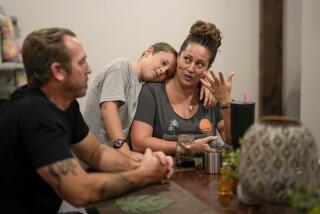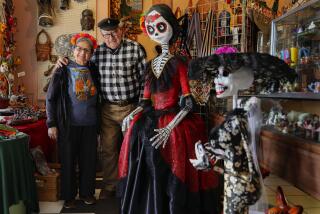Hope for a Family’s Happiness : Rare heart condition claims 2 of couple’s children and threatens the third, but an operation renews
- Share via
Ariel Folgar looked pale as the heart doctor approached with details about the operation on Folgar’s 11-year-old daughter, Patricia.
Nearby was Folgar’s wife, Margarita, her hands pressed together and her tired, red eyes fixed anxiously on the doctor.
The stakes were huge. Both parents--he a gardener, she a housekeeper--have a rare heart condition. Their two other children had died of sudden cardiac arrest from the ailment, both at age 10.
Patricia, a dark-haired cutie with a love of swimming and ice cream, had been diagnosed a few weeks ago with the same condition: a congenitally enlarged heart.
Now the Folgars, who came to the United States from El Salvador about seven years ago, were placing their last desperate hope for a happy home in the hands of a medical team at Good Samaritan Hospital in Los Angeles. A foundation had agreed to help finance the $50,000-to-$75,000 operation.
Patricia “was our salvation,” Ariel Folgar, 50, said in Spanish. “Imagine how we felt when we found out. I could not talk.”
Doctors decided to place a device inside the girl that would regulate erratic heartbeats and prevent sudden death. A long day of waiting had passed by the time Dr. David S. Cannom, medical director of cardiology at Good Samaritan, approached the Folgars late Thursday night to tell them whether the operation had been a success or failure.
*
The Folgars, who live in the Westlake district west of Downtown, had waited with their daughter in Room 446 since 7:30 a.m. for what was scheduled as a 1 p.m. operation. They watched television and talked, occasionally joined by relatives, friends or other visitors.
“I feel excited. I want to be operated,” Patricia, who wants to be a dolphin trainer, said shortly after noon. “It’s for my heart. It’s too big.”
About 30 minutes later, she turned her big brown eyes up toward the clock in her room.
“Uhhh, I’m starting to get a little bit nervous,” she said, pointing at the time.
Ariel Folgar, a slender, bespectacled man, spoke softly about his family and about how much Patricia means to him and Margarita, 45.
*
The girl was born two months after the Folgars’ first child, Reina Margarita, died in 1984. The older girl’s death came without warning.
But when the couple’s son, Angel Ariel, began having seemingly unexplainable fainting spells, they tried to find a cure.
Doctors in El Salvador could not help, so the family tried to find medical assistance in Mexico. There they were prescribed medicine to help control the boy’s heart problem, but he only lived two years under those conditions.
In addition, Ariel and Margarita learned that they both suffer from the same rare heart problem that was apparently killing their children.
“It’s unbelievable,” said Ariel Folgar, whose condition may be serious enough to require a heart operation. “For both of us to have it is amazing.”
The couple, though devastated by the loss of their children, found renewed zest for life through their youngest child, whom they usually call Patty.
Eager to improve their lives and avoid the political upheaval in El Salvador, they moved to the United States. They obtained permits so that they could work, but their combined income has remained low--about $25,000--and they lack medical insurance.
The Folgars watched their daughter anxiously as her 10th year passed. There were no complications until her 11th birthday approached in June. About six weeks ago, Patty fell down for no obvious reason while playing at Canyon School in Pacific Palisades and bruised her forehead.
Margarita’s boss and friend, Vicki Port of Brentwood, insisted that the Folgars get Patty checked out at a hospital.
Then a friend told Port about the Cardiac Arrhythmias: Research & Education Foundation, whose board of directors is chaired by Cannom.
The doctor said the surgery on Patty, placing a defibrillator inside her small body, was considered an unusual procedure because of her age and other factors. However, the family’s history convinced him and other medical experts that this would be the right thing to do.
“I’ve never seen a family like this before,” he said. “There’s a good chance that she’s going to die of it if we let nature take its course.”
The foundation, various doctors, the hospital and the company that makes the $25,000 device, Medtronic, donated the cost of the operation.
A successful operation would mean Patty should have no problems beginning sixth grade at Paul Revere Junior High School in September, said Cannom and Dr. Manuel R. Estioko, a surgeon involved with Patty’s case.
But on Thursday, the operation kept getting delayed. A hungry Patty, spaghetti and ice cream on her mind, was not taken out of her room on a gurney until about 5 p.m.
Shortly before 9 p.m., a slow-moving Cannom, still wearing his green operating room clothes and light-blue surgical cap, made his way down the hospital corridor toward the Folgars, their relatives and friends.
“She’s fine,” he said, smiling widely. “Everything just went perfectly. It took a while, but the device is working like a charm.”
Margarita Folgar, her eyes filled with tears, repeatedly thanked Cannom and hugged Vicki Port tightly.
Ariel Folgar, shaking the doctor’s hand, could barely speak.
By 10 p.m., family and friends were allowed to visit an awake but groggy Patty, who at last was being fed some vanilla ice cream.
“Seeing her made me feel like I was in a dream and I awoke and everything was fine,” Margarita Folgar said. “It’s a beautiful day.”
More to Read
Sign up for Essential California
The most important California stories and recommendations in your inbox every morning.
You may occasionally receive promotional content from the Los Angeles Times.










